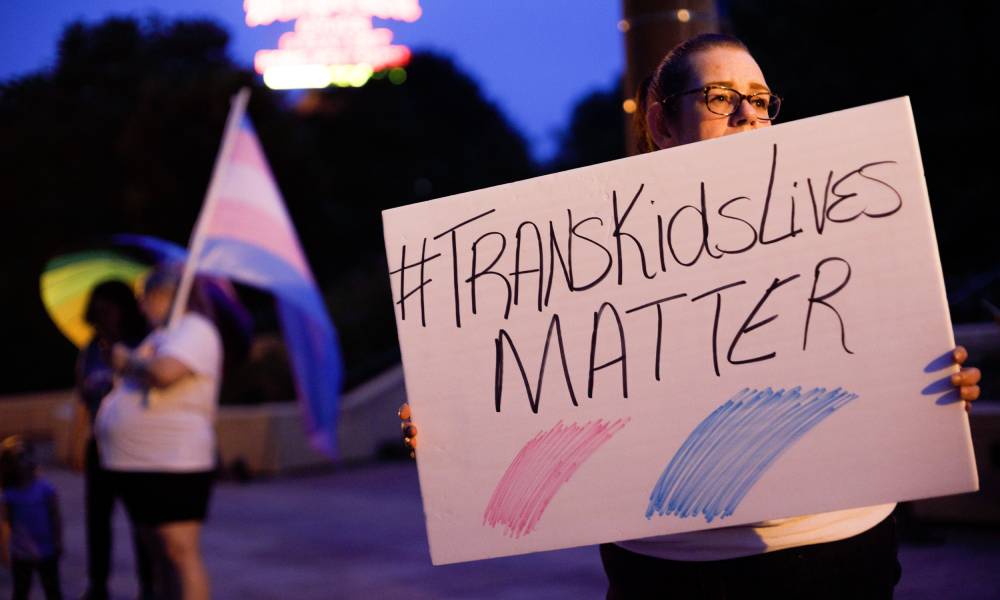Trans community breathes sigh of relief as Supreme Court rejects puberty blockers case

Keira Bell (right) outside Londons Royal Courts of Justice after winning her judicial review on 1 December, 2020. (Twitter/ Belstaffie)
The Supreme Court has rejected yet another attempt to deny trans kids access to life-saving puberty blockers.
Keira Bell first launched legal action against the Tavistock and Portman NHS Foundation Trust’s Gender Identity Development Service (GIDS), the only gender clinic for trans youth in the UK, in 2019.
She was joined in the High Court case, Bell v Tavistock, by “Mrs A”, a parent who wanted to prevent her then 16-year-old child taking puberty-blocking medication.
In a 2020 landmark judicial review, the court ruled in Bell’s favour, saying it was “doubtful” that 14 and 15-year-old’s could consent to taking puberty blockers, and that this was “highly unlikely” for 13-year-olds. This led to the suspension of puberty blockers being prescribed to under-16s.

Trans rights advocate holds a sign that reads ‘trans kids lives matter’. (Stephen Zenner/SOPA Images/LightRocket via Getty)
The NHS appealed the ruling and, in September 2021, the High Court’s decision was overturned. The Court of Appeal ruled that the High Court was “not equipped” to decide whether trans youth had Gillick competence, a concept used in medical law to decide whether under-16s can consent to their own medical treatment.
The ruling decreed that there was no “real distinction” between puberty blockers and young people being Gillick competent to access contraception.
Bell attempted to appeal the Court of Appeal ruling by taking it to the UK’s Supreme Court. However, on Thursday (5 May), the Supreme Court dismissed her request and said that her appeal application “raised no arguable point of law”.
Puberty blockers are medication prescribed to trans teens by specialist endocrinologists, which delay puberty until a trans teenager is old enough to make decisions about having gender-affirming medical treatment.
One 2022 study found that gender-affirming care like puberty blockers for trans youth was associated with 60 per cent lower odds of moderate or severe depression and 73 per cent lower odds of suicidality over a period of one year.
The trans community breathed a “massive sigh of relief”, with many declaring the decision a “huge victory” for trans kids and their families.
A massive sigh of relief for us at GI, and we hope a small balm to the wider community considering the constant setbacks we've all been putting up with the past few months.
❤️❤️❤️❤️❤️❤️❤️❤️❤️❤️❤️❤️❤️❤️❤️❤️❤️❤️❤️❤️❤️❤️❤️❤️❤️❤️❤️❤️❤️❤️
— Gendered Intelligence (@Genderintell) May 5, 2022
The Supreme Court has refused Quincy Bell’s application for permission to appeal in the matter of Bell v Tavistock!
A WIN for Gillick competence!
A WIN for trans youth!https://t.co/tDY2nGCWHh— LGBWithTheT (@LGBwiththeT) May 5, 2022
https://twitter.com/StephWoolleyTO/status/1522324487634628609
But news account What The Trans!?, run by activists Ashleigh Talbot and Michelle Snow, added that the entire case should serve as a “wake-up call” on the tenuous nature of trans rights in the UK.
They tweeted: “I’ll never forget the day it was announced that Keira Bell had won her nonsense judicial review.
“It was a wake up call to how dangerous things had become. I remember so many saying that she couldn’t win. Then she did.
“Never assume a court result.
“She lost the [right to] appeal. But as a result of all this, GIDs didn’t send anyone to the endocrinologist for nearly two years.
“We have to keep fighting and we can never assume that a court case will go our way.”
Trans rights charity Gendered Intelligence told PinkNews in a statement: “We are thrilled to see that justice has been served, and that this case can finally be put to rest.
“For many years now the spectre of Bell v Tavistock has been used to threaten care provision for young trans people, and the Supreme Court’s refusal to accept this case makes it abundantly clear that this cannot continue.
“The 2021 Court of Appeal verdict stated that “the [original] claim for judicial review should have been dismissed” outright, and that it “was inappropriate for the Divisional Court to provide the guidance” in the first place. Now the Supreme Court has said that this case has “no arguable point of law”.
“This case is, and always has been, about using the law to take healthcare out of the hands of the qualified medical professionals who provide it.
“We hope that now we can focus on the urgently needed task of overhauling gender identity services in the UK, and building trans healthcare provision that the nation can be proud of.”

